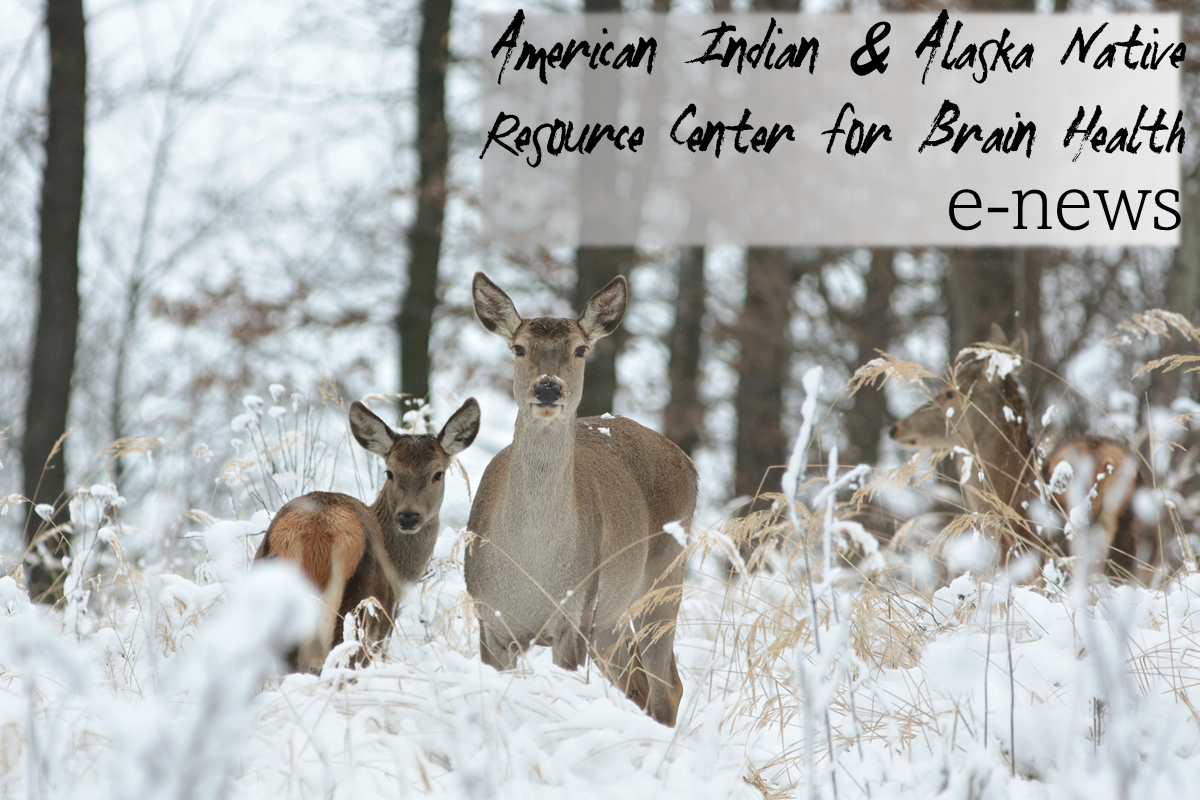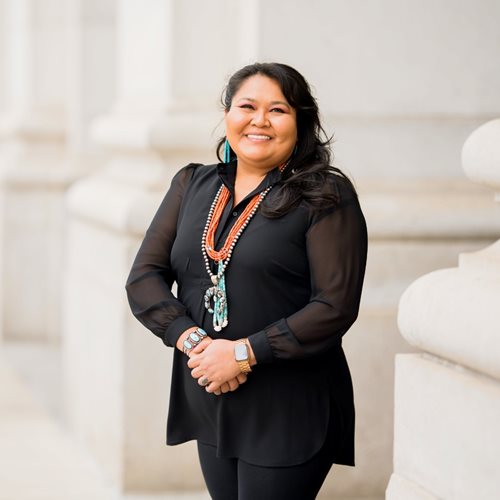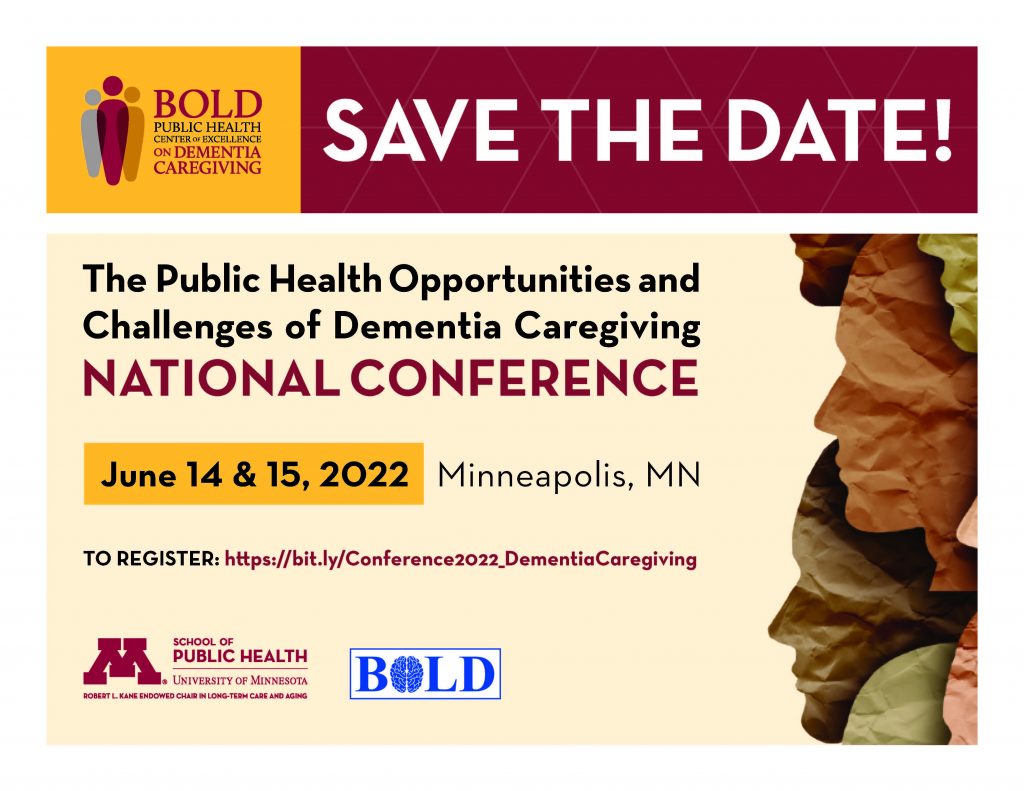Newsletter Navigation:
Clicking on each title with navigate to that section in the newsletter

The February Brain Health Resource Center In Action
 We are very excited to share our February updates. The IA2 team continues our busy run into the new year.
We are very excited to share our February updates. The IA2 team continues our busy run into the new year.- We will be offering our 2nd pilot of the virtual Dementia Friends for American Indian and Alaska Native Communities information session and Dementia Friends Champions training in March co-facilitated by one of our newly trained Champions from December. Be sure to read below for registration details and information. Please share with your communities and encourage folks to sign up.
- IA2 staff met with several state and local public health department staff in February to talk about approaches to working with tribal communities, discuss their brain health resource needs, and work to build new relationships. We welcome the chance to meet with you and your team to learn about your work, help navigate current resources in our online resource library, and identify future needs. Send us an email to schedule your “meet and greet” with IA2 staff to connect and learn. We’d love to meet you!
- Our brain health advisory group has been helping us this month with additional feedback on resource material messaging.
- Our team is compiling research to help with the development of resources and products on cultural adaptation for American Indian and Alaska Native communities, use of social media for meaningful behavior change, and brain health risk reduction interventions.
- IA2 continues to add new resources to the Brain Health Resource library daily. Check out this informative video about memory loss.
- Be sure to follow us on Facebook. We are always sharing great tips and information.
- IA2 hosted multiple Title VI Afternoon Chats regarding public health essential services and the public health approach. Watch the recordings here: Week 1. Week 2
- IA2 promoted various content on social media including self-care and support group opportunities. Follow on Twitter for future campaigns and social media messages you can use.
- IA2 ‘s own Bill Benson moderated the National Association of Chronic Disease Directors: Social Determinants of Health: Cancer Risk in American Indian and Alaska Native Populations.
Community Educator Supports Native American Caregivers
January 26, 2022
Valerie Tsosie, Navajo, is a community educator with the New Mexico Chapter of the Alzheimer’s Association. She leads the So’Tsoh Foundation, an organization that aims to create pathways to better health by offering innovative solutions for Diné caregivers.
In partnership with the National Indian Council on Aging (NICOA), a long-standing organization focused on the needs of aging American Indians and Alaska Native elders, the Alzheimer’s Association recently offered a webinar, “Understanding Alzheimer’s and Dementia,” which examined the impact of Alzheimer’s and how it affects these Native communities. Led by Valerie, the program included information about stages of the disease, risk factors, current research and treatments, and information on how individuals and families affected by the disease can access Alzheimer’s Association resources. “Sharing the importance of an early diagnosis is one of the topics I always focus on,” Valerie says. “There are so many moving parts for families to think about.”
 During Alzheimer’s education sessions with Native communities, Valerie says that Native families are open to learning more about the disease — and eager for resources. “These communities don’t have central offices, places to provide and house educational materials — and that includes Navajo, and we are one of the biggest in the nation.” When she started as a caregiver resource specialist with the Navajo Nation Division of Aging In 2018, Valerie was conducting caregiver education alongside five different agencies. That is when she realized that each individual Native community has their own very unique needs. “But at every training, people would ask the same question about signs in their mom, or grandpa: ‘Is this Alzheimer’s?’
During Alzheimer’s education sessions with Native communities, Valerie says that Native families are open to learning more about the disease — and eager for resources. “These communities don’t have central offices, places to provide and house educational materials — and that includes Navajo, and we are one of the biggest in the nation.” When she started as a caregiver resource specialist with the Navajo Nation Division of Aging In 2018, Valerie was conducting caregiver education alongside five different agencies. That is when she realized that each individual Native community has their own very unique needs. “But at every training, people would ask the same question about signs in their mom, or grandpa: ‘Is this Alzheimer’s?’
Thankfully I received the Road Map for Indian Country training, bringing these learnings back to our people,” Valerie says. The Healthy Brain Initiative (HBI) Road Map for Indian Country is a guide for American Indian and Alaska Native leaders to learn about dementia and start discussions throughout their communities. In working with tribes other than Navajo, Valerie discovered that American Indian and Alaska Native communities are facing many of the same hurdles. “The training was so helpful in how to approach these sensitive topics. I continually catch new people being impacted by the disease who need our help. I am identifying new and existing caregivers all the time.”
Caring for Our Elders, Who Cared for Us
In American Indian and Alaska Native communities, elders are the spiritual leaders, and there is a stigma around placing elders in long-term care communities. As these elders develop dementia, they are being cared for by family, in multigenerational homes, especially due to the effects of the COVID pandemic. But another obstacle exists. “Young people are encouraged to get an education, but if they are away from reservation for four to eight years,” Valerie says, “what happens to their families when they leave?”
Data from the Alzheimer’s Association 2021 Alzheimer’s Disease Facts and Figures report indicates that while 92% of Native Americans feel it is important for health care providers to understand a person’s ethnic or racial background, fewer than half feel they have access to providers who are culturally competent. “Like many people in the later stages of Alzheimer’s, Native people can become combative about leaving home, but more particularly their land, and being taken to a new, strange place,” Valerie says. “Unfamiliar people, doctors especially, can be very frightening, especially doctors who don’t speak their language.”
In Native communities, Valerie says, “Caregivers don’t identify as caregivers. Caring for their own is a way of life for Native people: You have children, you care for them, and when your parents age, you care for them. People will say: ‘I am not a caregiver, but I need information.’ When asked what they do, they list all the activities and responsibilities of a caregiver. I tell them, unequivocally: ‘You’re a caregiver.’ Many people in our communities think you are only a caregiver if you are being paid, caring for someone outside your own family unit.”
In addition to the hurdles around care and the family unit, reservations don’t have traditional resources within their grasp. “Our people don’t have easy access to pharmacies, hospitals, or traditional grocery stores. Some people must travel 30 minutes on a dirt road to reach another paved road, where they must travel another 30 minutes, and so on,” Valerie shares. “Supporting these caregivers on the reservations by providing resources and educating communities will result in better care.”
Caregiver programs in American Indian and Alaska Native communities delivered by dedicated educators like Valerie importantly allow people to receive education and support from someone they trust, who looks like them, and who speaks their language. Death is taboo in Native cultures, yet Valerie knows that unanswered questions around Alzheimer’s only happen when people are passive. “I tell people: ‘If you have questions, keep asking.’ If you need help, we can find the answers. Be your own advocate, and be prepared when you go to the Indian Health Service (IHS), writing down the signs and changes you see in your loved one. Push for an accurate diagnosis.”
As part of the Navajo nation, Valerie says other surrounding tribes differ in their own traditions, and way of life, and educators have to come into the situation with understanding. “I’m here to help people because I know that the struggle is very real for our communities. Education I provide through the Alzheimer’s Association can help these communities face Alzheimer’s together, and help people realize that they are not alone.”
Native communities are still greatly in need of solutions to care and the cost of care for elders. With support groups, training and educational programs in place, Valerie wants the public to know the facts. “Caregivers are a critical part of approaching the aging population. Without them, much of the economy would not function. It’s my goal to continue to make a difference in Native communities as we face this disease as a nation.”
This blog post does not belong to IA². To view the original blog shared by the Alzheimer’s Association please click here.
Voices from the Community: Life has its way of bringing you to places, you least expect.
By: Evelina Maho, MAdm., Public Health Program Manager, National Council on Urban Indian Heatlh
Greetings!
I joined the National Council of Urban Indian Health (NCUIH) in October of 2020. As a non-profit organization housed in Washington, DC., NCUIH advocates through policy with a team of lawyers and attorneys, providing technical support and research to our member Urban Indian Organizations.
 My role as the Public Health Program Manager includes building capacity, enhancing, and developing coordinated Public Health systems with 41 Urban Indian Health Organizations in the United States. With a team of passionate colleagues, National Partners and our grassroots American Indian leaders and community members, we strive to create a safe, quality-driven, and equitable health care system.
My role as the Public Health Program Manager includes building capacity, enhancing, and developing coordinated Public Health systems with 41 Urban Indian Health Organizations in the United States. With a team of passionate colleagues, National Partners and our grassroots American Indian leaders and community members, we strive to create a safe, quality-driven, and equitable health care system.
Life has its way of bringing you to places that you least expect. As the work continued in each new day, my personal life began to unveil unexpected loss of family and extended relatives due to aging, dementias, chronic health conditions, and in some cases exacerbated by the pandemic. It is still painful and at times I feel helpless, but I also have hope and believe we can incorporate healthier ways into our lives and support our loved ones, and take time to care for ourselves as well. These life events and NCUIH introduced me to the International Association for Indigenous Aging (IA²). I work with IA² as an Advisory Committee Member. on behalf of our American Indians/Alaskan Natives, I’m able to speak and contribute to the content and materials developed by IA². This is one of the many projects on which I assist through NCUIH. Dementias and how we better support our aging populations in Indian Country is one of our public health concerns and is thus so important.
 The National Council of Urban Indian Health has launched the social media campaign titled “Wisdom Keepers” to raise awareness of dementias; this was created in partnership with the Centers for Disease Control and Prevention. Check out one of the many videos in a series below. Or you can click here to Check out the Wisdom Keepers Media Campaign.
The National Council of Urban Indian Health has launched the social media campaign titled “Wisdom Keepers” to raise awareness of dementias; this was created in partnership with the Centers for Disease Control and Prevention. Check out one of the many videos in a series below. Or you can click here to Check out the Wisdom Keepers Media Campaign.
Become a Dementia Friend for American Indian and Alaska Native People!
 Please join us and become a Dementia Friend! Dementia Friends help make their community more accessible for people living with dementia. These training sessions are developed by and for American Indian and Alaska Native communities. This March we will be piloting this newly developed program content and asking for feedback to further improve these trainings.Help make your community more accessible, become a Dementia Friend! The Information Session will take place on March 23rd at 12:00 PM (Eastern Time) / 9:00 AM (Pacific Time) To register for the Information Session click here!The Champion Training will take place on March 30th at 3:00 PM (Eastern Time) / 12:00 PM (Pacific Time) To register for Champions Training click here!If you are interested in learning more about the Dementia Friends Initiative or attending our upcoming session, please visit our Dementia Friends page by clicking here.
Please join us and become a Dementia Friend! Dementia Friends help make their community more accessible for people living with dementia. These training sessions are developed by and for American Indian and Alaska Native communities. This March we will be piloting this newly developed program content and asking for feedback to further improve these trainings.Help make your community more accessible, become a Dementia Friend! The Information Session will take place on March 23rd at 12:00 PM (Eastern Time) / 9:00 AM (Pacific Time) To register for the Information Session click here!The Champion Training will take place on March 30th at 3:00 PM (Eastern Time) / 12:00 PM (Pacific Time) To register for Champions Training click here!If you are interested in learning more about the Dementia Friends Initiative or attending our upcoming session, please visit our Dementia Friends page by clicking here.
|
Featured Resources & News
 | News: | Dementia Friends for AI/AN Communities Information Session March 23 and Champion Training March 30th! | |
 | Video: |
| |
| Flyer: | |||
| Toolkit: | |||
| Printing Assistance: |
| ||
| Blog: | |||
| Resource: |
| ||
| Resource: |
| ||
| Resource: | |||
| Resource: | |||
| Opportunities: | |||
| Webinar: |
Connect & share with other American Indian and Alaska Native communities.
Contact us to share Alzheimer’s disease, dementia, and brain health community news, resources, information, and promising practices happening in your community or others.
Brain health e-News for and by American Indian and Alaska Native communities.

 The AHEAD Study is an NIH-funded clinical trial aiming to prevent Alzheimer’s disease. Indian Country can support Alzheimer’s disease research by ensuring representation in research to help find treatments that work for everyone.
The AHEAD Study is an NIH-funded clinical trial aiming to prevent Alzheimer’s disease. Indian Country can support Alzheimer’s disease research by ensuring representation in research to help find treatments that work for everyone.
 IA²’s partner HFC (formerly Hilarity for Charity) offers commitment-free support groups for families & friends of people living with dementia or memory problems.
IA²’s partner HFC (formerly Hilarity for Charity) offers commitment-free support groups for families & friends of people living with dementia or memory problems.
 COVID-19 has proven many challenges including social distancing which hinders social connectedness.
COVID-19 has proven many challenges including social distancing which hinders social connectedness.
